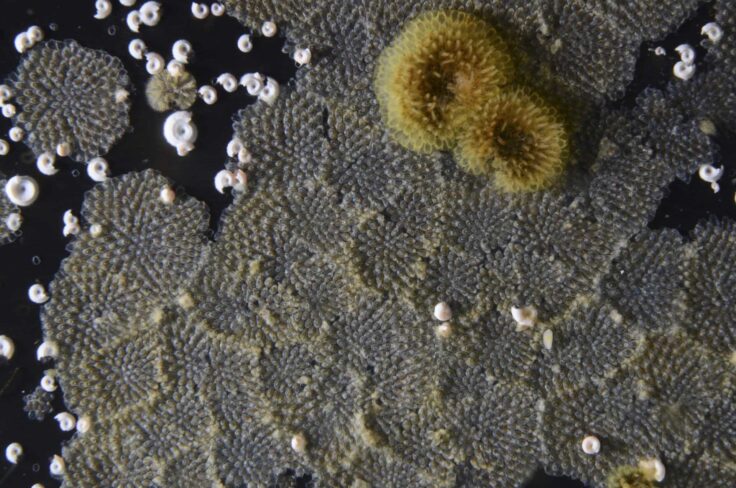NEWS STORY: Fighting for space on the seabed
New research highlights differences between the tropics and the poles
Rivalry between species is common the world over as animals fight for territory and resources such as food. But, according to scientists at British Antarctic Survey (BAS), competition between underwater species at the poles can differ markedly from that at the tropics.
Writing in Current Biology this week the team analyses how these confrontations on the seabed are organised. By studying rocks and small boulders taken from the shallows, they measured the outcomes of thousands of battles between bryozoans and other inhabitants of the seabed like corals and sponges. The severity of these contests was three times lower at the poles than in the tropics. And they tended to end in a tie rather than in one species being overpowered and devoured by the other.

Bryozoans are invertebrate creatures that live attached to the seabed and filter food particles through their tentacles. The poles are known for the abundance of species but there is less variety in the shallows because of iceberg scouring. So competition in these regions is more likely to be within species, rather than between species of the same family elsewhere. The conditions tend to favour fast growing species so only they will survive and only a few will remain dominant.
The researchers studied competition on the seabed at two Antarctic locations and one Arctic, three locations in the tropics and three in temperate seas and compared the outcomes of the confrontations at the different latitudes.
Lead author, marine ecologist Dr David Barnes, from BAS, says:
“We were surprised that competition was no more frequent in the tropics than at the poles. You see higher abundance in the poles but the environment is harsher with icebergs often scouring the bed. Only a few opportunistic species can survive this disturbance which means interactions are much more likely between the same species. In the future, tropical waters may become more disturbed due to the increasing frequency of storms, for example. So the situation we see today in the polar regions may help us understand what is likely to happen in the tropics.”
Co-author, mathematical ecologist Dr. Anje-Margriet Neutel, also of BAS, says:
“The organisation of competition plays a central role in our understanding of the dynamics of these ecosystems. It may seem strange but ecologists don’t actually know very much about how inter and intra-species competition works in systems where there are many competing species.”
The research was funded by the Natural Environment Research Council (NERC).